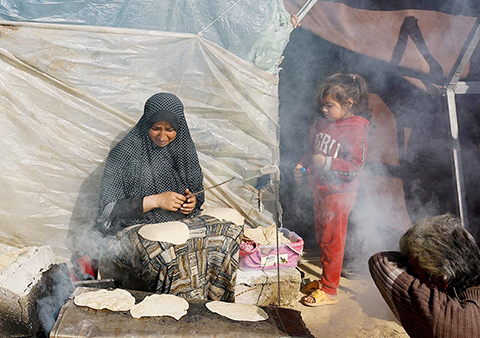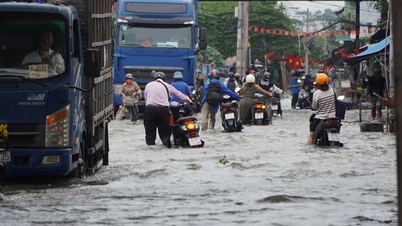After more than two months of retaliatory attacks against Hamas, Israel is gaining the upper hand on the battlefield. However, the consequences of this war have left more than half the population of the Gaza Strip facing starvation.
The United Nations has warned of a worsening famine among Palestinians in the Gaza Strip. (Photo: REUTERS)
The United Nations World Food Programme (WFP) says that more than 1.9 million of the 2.3 million people in Gaza have been displaced and are finding little to no shelter or food following Israeli attacks. This is an “unacceptable” situation.
Meanwhile, the Director-General of the World Health Organization (WHO), Tedros Adhanom Ghebreyesus, expressed concern about the attack on Kamal Adwan Hospital and called for an immediate ceasefire and for sustainable humanitarian access to health facilities in the Gaza Strip.
According to incomplete statistics from the Gaza Ministry of Health , Israeli attacks have killed more than 18,200 people and injured nearly 50,000. The Kerem Shalom crossing was closed after a week-long ceasefire collapsed on December 1, halting aid operations. More concerning, the conflict has reached a climax as Israel relentlessly pursues Hamas by any means necessary, aiming to gain control of the Gaza Strip.
The UN also stated that the UN Satellite Centre (UNOSAT) determined that 18% of Gaza's infrastructure has been destroyed since the conflict between Hamas and Israel began. Specifically, UNOSAT identified 10,049 structures destroyed, 8,243 severely damaged, and 19,087 moderately damaged, totaling 37,379 affected structures. This represents approximately 18% of all structures in the Gaza Strip. The statement read: “These findings underscore the urgent need for an immediate ceasefire and support to address the escalating humanitarian crisis in the Gaza Strip.”
CNN reported on December 12th that the UN General Assembly voted to call for an immediate humanitarian ceasefire in Gaza. The resolution, which called for a ceasefire, was passed with 153 votes in favor, 10 against, and 23 abstentions. The United States and Israel were among the 10 countries that voted against. In addition to calling for a ceasefire, the resolution also demanded that Hamas release all hostages immediately. This resolution had failed to pass last week due to the US veto.
Although not legally binding, resolutions of the UN General Assembly still have political influence and reflect the views of the international community.
Earlier, US State Department spokesman Matthew Miller said the US was closely monitoring the conflict and engaging in dialogue with the Israeli government regarding compliance with the laws of war after receiving weapons from the US. Despite these close monitoring efforts, the US also expressed concern about reports that Israel had used US-supplied white phosphorus ammunition in an October attack in southern Lebanon. Israel has denied these reports.
Observers believe that while Israel's counterattack against Hamas was legitimate self-defense, the fact that it targeted civilians, leading to a humanitarian disaster in the Gaza Strip, has angered the international community. This move will damage Israel's credibility worldwide and could lead to isolation if a humanitarian ceasefire is not implemented in time to help innocent civilians suffering from hunger and disease.
Palestinian Hamas leader Ismail Haniyeh said on December 13 that Hamas is ready to negotiate with Israel on any agreement or initiative that could lead to a ceasefire in the Gaza Strip. However, Israel has yet to respond. |
HN compilation
Source




![[Photo] Prime Minister Pham Minh Chinh presides over a meeting on private sector economic development.](/_next/image?url=https%3A%2F%2Fvphoto.vietnam.vn%2Fthumb%2F1200x675%2Fvietnam%2Fresource%2FIMAGE%2F2025%2F12%2F20%2F1766237501876_thiet-ke-chua-co-ten-40-png.webp&w=3840&q=75)





























































































Comment (0)